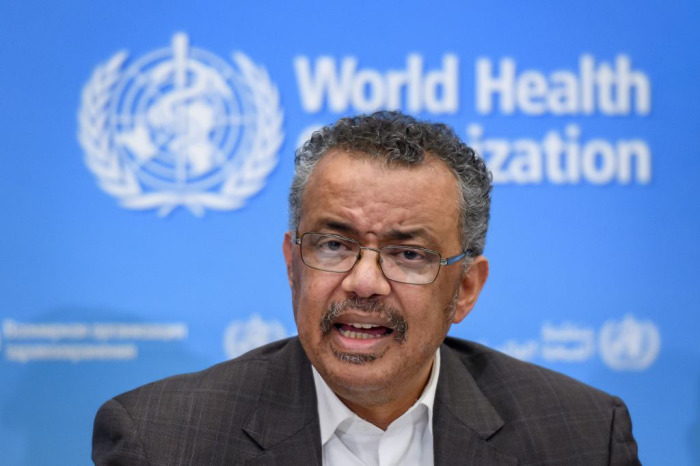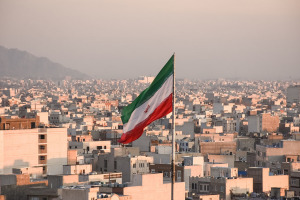WHO is Tedros Adhanom Ghebreyesus? 3 things you need to know

Tedros Adhanom Ghebreyesus, who is not a physician but has been leading the World Health Organization's new coronavirus response, has come under severe criticism, including from President Donald Trump, for not holding China accountable for concealing the truth about the disease. Here are three things about him that have surfaced.
Tedros, the first African and non-medical doctor to become director-general of the United Nations’ health agency and who will be in office for two more years, is being blasted for sounding the alarm too late even as numerous reports point to the responsibility of the Chinese Communist Party in putting millions of lives and the global economy at risk as it downplayed the coronavirus outbreak initially.
In late January, Tedros met with Chinese President Xi Jinping in Beijing and then praised the Chinese government for “setting a new standard for outbreak control” and its “openness to sharing information.”
However, anonymously speaking to Bloomberg, three officials recently said the U.S. intelligence community noted in a classified report to the White House last week that China lied about the extent of the COVID-19 outbreak, under-reporting the number of infections and deaths.
“The reality is that we could have been better off if China had been more forthcoming,” Vice President Mike Pence said on CNN recently. “What appears evident now is that long before the world learned in December that China was dealing with this, and maybe as much as a month earlier than that, that the outbreak was real in China.”
“Despite the WHO’s purported mission to operate as an apolitical international institution within the United Nations, recent media reports suggest that the WHO helped Beijing disseminate propaganda, downplayed the extent of the disease, and possibly delayed ordering a public health emergency,” Republicans on the House Oversight and Reform committee wrote to Tedros last week, according to The Hill.
“Given the actions and statements of WHO officials during the past few months, we are concerned that the WHO is no longer serving the needs of the world and is instead taking its cues from China. Throughout the crisis, the WHO has shied away from placing any blame on the Chinese government, which is, in essence, the Communist Party of China,” they added.
Here are three things about Tedros, who holds a Doctorate of Philosophy in Community Health from the U.K.’s University of Nottingham and a Master of Science in Immunology of Infectious Diseases from the University of London.
Tedros was accused of covering up cholera outbreaks in Ethiopia, Sudan
Tedros, who is Ethiopian by nationality, served as Ethiopia’s health minister between 2005 and 2012 and was accused of refusing to record cholera epidemics three times — in 2006, in 2009 and in 2011.
The allegation was made by Prof. Larry Gostin, now the director of the WHO Collaborating Center on Public Health Law & Human Rights.
“Dr. Tedros is a compassionate and highly competent public health official. But he had a duty to speak truth to power and to honestly identify and report verified cholera outbreaks over an extended period,” The New York Times quoted Gostin as saying in May 2017, before Tedros was elected to lead the organization.
The WHO “might lose its legitimacy” if it was led by someone who has been accused of covering up epidemics in his home country.
In September 2017, about four months after Tedros, 55, was elected as WHO director-general, some U.S. doctors specializing in infectious diseases, wrote an open letter to him, holding him and the WHO responsible for refusing to classify a cholera outbreak in Sudan in an attempt to guard its global reputation.
“Your silence about what is clearly a massive cholera epidemic in Sudan daily becomes more reprehensible,” they wrote. “Your failure to transport stool samples from victims in Sudan to Geneva for official confirmation of cholera makes you fully complicit in the terrible suffering and dying that continues to spread, out of control, with daily new reports confirming that this is indeed a cholera epidemic.
“The inevitable history that will be written of this epidemic will surely cast you in an unforgiving light.”
Tedros has denied the allegations, calling them attempts to harm his reputation before his election.
Tedros was part of the Ethiopian regime during gross human rights violations
When Tedros was Ethiopia’s minister of Foreign Affairs between 2012 and 2016 and was part of the governing party’s and coalition’s leadership committees, the country was accused of human rights violations, including the killing of protesters and political targeting of opponents and journalists.
“Large-scale and unprecedented protests swept through Ethiopia’s largest region of Oromia beginning in November 2015, and in the Amhara region from July 2016. Ethiopian security forces cracked down on these largely peaceful demonstrations, killing more than 500 people,” the Human Rights Watch said in a report during the time.
“Scores of people fleeing security force gunfire and teargas during the annual Irreecha festival died in a stampede on October 2 in Bishoftu, Oromia region. On October 9, following the destruction of some government buildings and private property by youths, the government announced a draconian and far-reaching six-month countrywide state of emergency, which prescribes sweeping and vaguely worded restrictions on a broad range of actions and undermines free expression, association, and peaceful assembly.”
The report added, “The protests occurred against a background of nearly non-existent political space: in parliament, the ruling coalition has 100 percent of seats, there are restrictions on civil society and independent media, and those who do not actively support the government often face harassment and arbitrary detention.”
When the Ethiopian government proposed expansion of the municipal boundary of the capital, Addis Ababa, in 2016, protests followed in which “security forces arrested tens of thousands of students, teachers, opposition politicians, health workers, and those who sheltered or assisted fleeing protesters.”
The HRW also said the government at the time sought to control and gag the media and forced many journalists “to choose between self-censorship, harassment and arrest, or exile.”
Tedros was given the Jimmy and Rosalynn Carter Humanitarian Award in 2011
Tedros was the recipient of the Jimmy and Rosalynn Carter Humanitarian Award in 2011 when he was Ethiopia’s minister of Health.
“A pioneer in malaria research, Dr. Tedros has devoted his life to public service and scientific research,” it was noted at the time. “Dr. Tedros is recognized for his leadership in the rapidly evolving field of global health, and has worked to enhance Ethiopia’s active engagement in major international forums… Through all his appointments and activities, he has kept his eye on the prize: Bringing about a real and lasting improvement in the health conditions of his own country.”
“In his five years as Ethiopia’s Minister of Health,” Dr. John Hardman, president and CEO of The Carter Center, said at the time, Dr. Tedros “has embarked on an ambitious effort to improve the health of Ethiopians through efforts to address specific diseases such as malaria and HIV/AIDS, and to improve the structure and capacity of Ethiopia for health services, with a special emphasis on maternal care.”




























